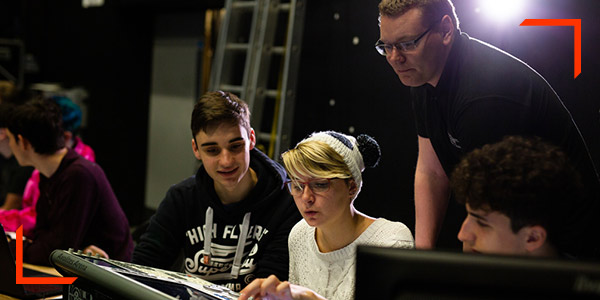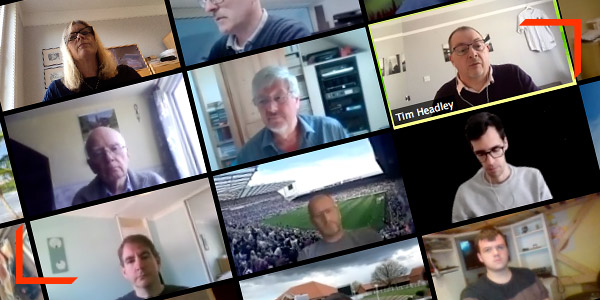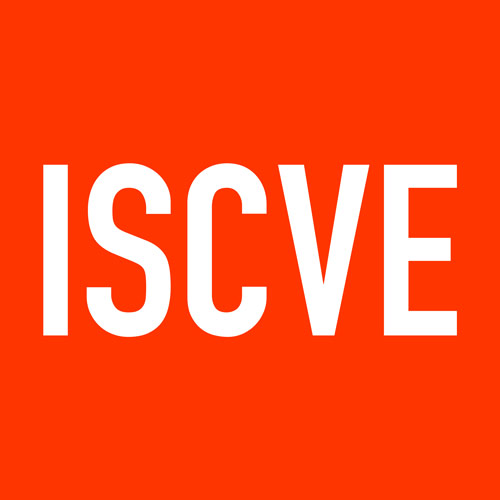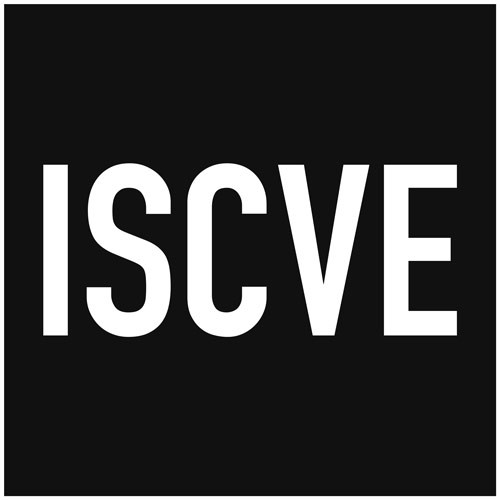Adapting to on-line learning in higher education
University of Derby
Most of you are aware of how the COVID-19 situation is affecting different walks of life.
One profession that is not in stasis is education. With schools, colleges and universities closing to face-to-face teaching, we have seen a dramatic, but mainly positive, shift to online learning. This happened in a relatively short space of time, leaving many educators facing a novel selection of challenges almost overnight.
For those of you who have not had dealings with University education recently, much has changed, but most things haven’t!
I retired from 35 years as a touring live sound engineer to join the Entertainment Electronics department at Derby University. I teach on the BSc in Sound, Light & Live Event Technology and MSc Audio Engineering courses, in a role created when our esteemed fellow ISCVE member, Simon Lewis, retired. It was a massive change for me and stepping into a role so defined by Simon has been hard, but also very rewarding. Since starting in September, having just got the hang of a regular Monday to Friday job (my first ever), but the structure and discipline of higher education, I now had to think how to adapt my teaching to an online model.
For those of you who have not had dealings with University education recently, much has changed, but most things haven’t! We still deliver lectures, mostly in a format that would be recognised by students of a hundred years ago, the changes being that we can now refer to a power-point. We can record, so lectures can be viewed and reviewed. We can share content on the screen that is only limited by our imagination.
Our students are no longer reliant on the contents of the library, grabbing the dog-eared textbooks poured over by countless former years. They now have access to almost everything! As a University, Derby subscribes to a bewildering range of journals and publications, giving students the opportunity to stay at the cutting edge of research in a way that was not even possible thirty years ago. This embracing of knowledge has had a profound affect on our expectations of students. We know they have the world at their fingertips! I am not qualified to comment on how much has changed in the last thirty years, but I can tell you what has happened in the last 3 months.
My teaching this semester was primarily practical, hands on. We have a reasonably sized auditorium with enough equipment, truss, motors, lights, PA, to put on a professional show. We would now be working with bands, doing show cases, practical, real-world training. I have been running mixing masterclasses in small groups and sharing my experience. Industry colleagues were just starting to come in to share their expertise. This has all stopped.

The lectures have moved on-line, and this has proved a revelation. There is nothing like seeing a lecture delivered by a charismatic speaker in a room, in person. However, the online experience is going ok, I believe. I have been sitting in supporting colleagues on their lectures and I have been learning! Sometimes the ability to zone in on your screen, following the slides, especially equations(!), and taking notes, even googling terms you don’t quite understand, has been great. We have found that asking questions as in traditional lectures is rare, but you can leave a chat open and people can anonymously make comments and ask questions. These are being taking full advantage of. The ability to ask a question without appearing ignorant to your lecturer or classmates is a real bonus! Often other students will answer on behalf of the lecturer. There have been many positives like this.
I think we are all living in a Teams, Webex, Zoom world now.
I don’t know how many of you have made this jump, but it has been the saving of our teaching. Previous tools that just recorded the lecture that could be replayed are dead in the water. We are now able to deliver a viable lecture that is collaborative, immersive and reasonably technically trouble free. I have been amazed how the infrastructure seems to be holding up. When we encounter technical problems, people are supportive and patient, how long this will last, I don’t know, we are still in the honeymoon period!
We hit the last week of teaching at the end of April and as I write this, exams loom. These have also moved online. We are obliged to continue with exams as a way of testing our students. I, like many of my colleagues, would rather rely on report writing, project work, presentations, but we are tied to the exam. Why? Tradition takes a part. This is not just from higher education but our accrediting partners. Our degree is accredited by the IET and the pressure from them is towards exams, which this year, have been thrown into disarray.

As I write, my colleagues have been brainstorming, re-writing, and generally trying to adapt an age-old tradition to our new online solution. The problems are huge, but nothing is insurmountable. With exams going online they will need to be open book, meaning you can have access to materials to help you answer. A problem? Well if it is, it is one that exists in the real world. If you were set a task to investigate a problem by your production manager would they expect you to complete it based on the knowledge retained in your head? No, they would expect you to use every sensible resource available to solve it, so maybe that is a real positive. All the academic offences will still apply, collusion etc. You won’t be able to sit there and bribe your flat mate to help you. Hopefully we are savvy enough as teachers to know our pupils, and recognise offences, especially after several years!
As a degree course we are rooted in industry. We have strong links which we rely on to help support our teaching, mainly in providing opportunity and experience for our student body. Although a University science degree there is an element of the apprenticeship style of learning that older members will recognise from the days of polytechnics. Summer has always seen students working in industry, returning in the Autumn with a new sense of purpose, and enthusiasm, and sometimes with a job offer on graduation. This will be something that will be sorely missed this year.
This article stemmed from an ISCVE get together meeting via Zoom, one of the many new portals that we are turning to. It was great to meet so many new people and listen to everyone’s experience. It was also a testament to our membership that so many of you offered support and help, and the most important, possibilities of mentorship, even if initially these may only be on-line. After we come out of this it would be great to continue building these bridges to the younger generation, and to the establishments like my own that are educating them. Let us keep up the conversation and forge strong links so that you, as employers, can help and inform people like myself, the educators. Let’s give the students as much insight and knowledge as we can from both sides to give them the best start in this daunting, but ever-changing world.
I would like to give thanks to all the industry online resource providers, particularly from my point of view L’acoustics, D&B, Nexo, Shure and my current favourite Soundgym…..

The nice people at Soundgym provided a months free membership to the gym for all my Derby students, even the tutors have been working out with Assoc. Prof. Adam Hill currently in the lead, but nowhere close to top student Thomas.



